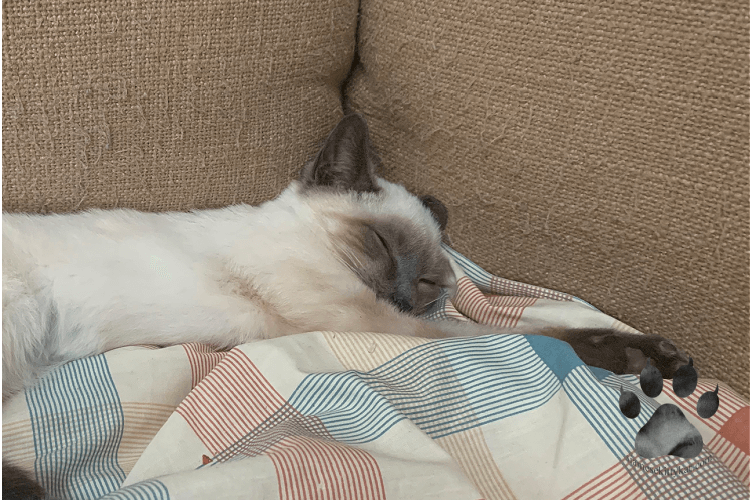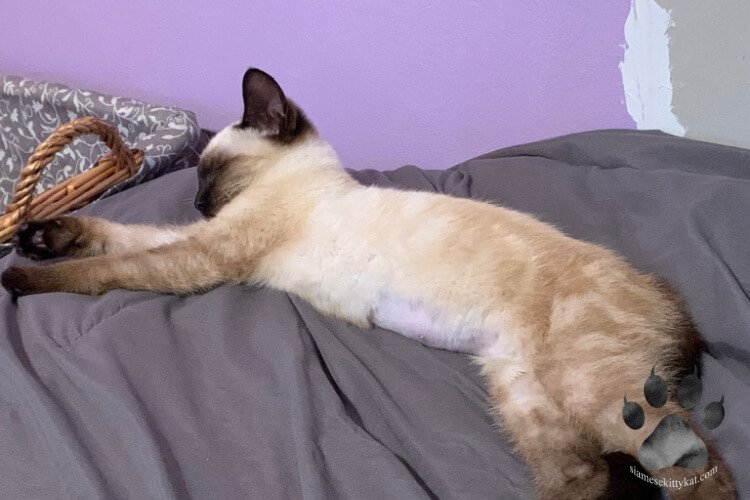I have always been a huge cat person. I love nothing more than spending time with my fluffy Siamese cats, Batman and Robyn. They are the sweetest felines, with their soft fur and gentle purrs.
However, there was one thing that always puzzled me about my beloved pets. Why are they constantly drooling?
I learned after doing some research that the drooling behavior of Siamese cats is common. There are many potential underlying causes for this behavior.
Some possible explanations could include stress or anxiety and teething. Drooling is harmless in most cases, and you can manage it with proper treatment and care.
In other cases, however, drooling can sometimes be a symptom of various cat health issues.
This article will help you better understand your Siamese cat’s drooling behavior. Read on to learn more!
Is It Normal for a Siamese Cat to Drool?
It is normal for Siamese cats to drool, especially when feeling relaxed and content.
One thing you can do to know if your cat is drooling normally is to assess its overall health. His drooling behavior falls within the normal range if he appears healthy and active.
However, your cat might have health issues if he seems lethargic.
The amount and frequency of your cat’s drooling can also provide insights if this behavior is normal. Minor instances of drooling may reflect your cat’s affectionate nature. This can usually be considered quite normal.
Excessive drooling or consistent episodes of drooling could indicate an underlying medical issue.
Why is My Siamese Cat Drooling?

1. Teething Pain
Your cat’s adult teeth start coming through around 6 months. They may experience some discomfort and irritation in their mouths during this time. It may manifest as drooling.
2. They are happy
One of the most common ways that Siamese cats display joy is by drooling. When a Siamese cat sits in your lap, it may begin to dribble from its mouth as it relaxes and enjoys the moment.
3. They See or Smell Food
There is nothing quite like the smell of a delicious meal to get your Siamese drooling! My cats drool when I am preparing a meal or even opening a bag of cat food.
Don’t be alarmed if your cat seems extra drooly when you’re cooking or bringing out some kibble. This only means that your cat loves the scent of whatever you are preparing and can’t wait to take a bite.
4. Oral Health Issues or Dental Disease
Another cause of drooling is oral health issues like tartar build-up or tooth decay. Periodontal disease can also cause pain or discomfort in your cat’s mouth. These dental conditions may make your cat more inclined to salivate.
Take a closer look at your cat’s mouth and teeth if you notice him drooling more than usual. Look for any signs of redness or swelling around the gums and teeth, and any discoloration on their teeth. These can all be signs of dental issues causing your cat’s excessive drooling.
You should make an appointment with your vet to find out if your cat has oral health problems. The vet can perform a thorough oral exam on your cat and prescribe treatment or medications.
There are some things you can also do at home to help promote good oral health in your Siamese cat. Feeding it high-quality food low in sugar and fat can help keep its teeth clean and healthy. It will also discourage bad breath and excessive drooling.
Brushing your cat’s teeth on a regular basis can also help prevent tartar buildup and plaque.
5. Certain medications
Talk to your vet if your cat is taking medication and you notice excessive saliva.
6. It ingested a poisonous substance
This could be something in your home, such as toxic plants. It could also be the chemicals you’ve been using around the house, like paints or cleaning agents.
Take your cat to the vet if your cat has come into contact with something toxic.
You should also take steps to keep your cats safe from toxins in the future. This may mean taking measures to keep poisonous plants out of your home. Use pet-safe chemicals when cleaning or painting and safely store harmful chemicals.
7. Tumors
Drooling may be a sign that your cat has a tumor in the mouth.
Treatment for oral tumors in cats will vary depending on their severity and location. Surgical removal may be possible in some cases. However, this can be difficult or impossible if the tumor is too large or invasive.
8. They are suffering from heat stroke
Your cat’s drooling could be a sign that he is suffering from heat stroke. This condition occurs when your cat is exposed to too much sunlight or doesn’t drink enough water.
There are things you can do to keep your Siamese cat safe from heat stroke:
9. They Have Injured Their Mouth
Siamese cats can become slobbery if they get injured in the mouth. This is because their jaws are sensitive, and any trauma to this region can cause them to begin drooling.
This often happens after a fight or an accident that leaves your cat with a cut or broken tooth. Make sure to take them to the vet right away if you see any cuts or torn gums.
10. Anxiety

Your cat may feel stressed or anxious about changes in its environment or routine. Your Siamese cat may feel anxious if you recently moved to a new home. This is because of all the unfamiliar sights and sounds around him. This anxiety can manifest as drooling as your cat tries to cope with such changes.
Another trigger for drooling is negative interactions with other pets or people. Your cat may experience stress and anxiety if other pets like to chase your cat. Thus, it may manifest as drooling.
To relieve your cat’s anxiety and reduce drooling, there are steps to take to manage this behavior.
I was worried when I first noticed that my Siamese cat was drooling. I thought he had been eating something terrible or had gotten into an accident. I watched him closely, and it became clear there was nothing wrong with him physically. He was stressed and anxious.
I knew that my cat loved to play and chase after toys. Lately, he had been lethargic and seemed disinterested in playing at all. He would sit there with a blank look on his face whenever I tried to engage him in fun activities.
I started spending more time playing with him to help soothe his anxiety. I try to keep things as peaceful as possible around our home.
Another common cause of stress in Siamese cats is frequent trips to the vet. Your cat associates the carrier with a trip to the vet and may start drooling to express anxiety.
One way to reduce this stress is to get your Siamese cat used to being in his carrier and on car rides. You can do this by leaving the carrier around the house where your cat can explore it at their own pace. You may reward him with treats when he does so.
You can also start getting your cat into the car without taking them anywhere. You are building up their tolerance and confidence this way.
It is normal for cats, including Siamese cats, to drool occasionally. This indicates that they are feeling relaxed and content. However, it is a good idea to consult your veterinarian if you notice other signs of illness.
Drooling is not a cause for concern in general. You can sometimes manage this by providing your cat with plenty of fresh water and a healthy diet.
Consider investing in pet insurance to protect your feline from potential health issues. It will provide you with peace of mind in an unexpected medical emergency.
We gathered all the health tips tailored towards maintaining your Siamese cat’s optimal well-being. Check it out here: Siamese Cat Health: A Complete Guide
